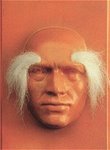
People claim it is impossible to establish reads online. After all, it is not as if you can glance over the table and see the Russian stereotype play with his Oreos.
However, because a lot of players believe that you can’t spot tells, they tend to play quite a conservative style – and that means it can be quite easy to read their game.
For starters, always keep tabs on those players who are multi-tabling as a significant majority will play the same type of game – it will be tight and conservative.
Consider this:
You spot a player called Frustrated Bulimic at your low level table. You scroll through the lobby and see that he/she is playing at least five other tables and has roughly the same amount of chips on each.
I can almost guarantee that he/she will be playing about 11-15% of hands and spewing out the rest. A raise from early position will be a premium hand and their opening requirements will not loosen much as they move closer to the button.
Nothing profound there.
However, when he/she calls your opening raise, you can almost always put them on one or two hands: either a pocket pair or AK (possibly AQ, depending on your position and the opponent’s proximity to the button).
These types of player don’t like to put in too much pre-flop and will be trying to either flop a set or see how you play if an ace hits. This gives you a significant edge.
If the flop is full of blanks, bet three quarters of the pot. A statistically important amount of the time, your opponent will fold. If you are called, you are either against an over-pair or a set. You should check the turn and probably toss the cards to any bet.
It becomes slightly more complicated if there is a draw on the board. In those cases, you will have to have a more in-depth knowledge of your opponent. You have to be extremely sure that if you bet again the player will fold, as a bet on the turn of three quarters of the pot will be a large proportion of your stack.
A trickier scenario is when you have an over pair, the flop looks harmless and your opponent either calls or raises. Again, you are probably against an over pair or a set but it is a lot harder to toss your aces or kings.
So, what do you do?
Well, as always in poker, it depends. Any read that you have in game is an asset but here are some general pointers.
What do you think will happen if you raise again? If you think you will be staring at a push, then you must suspect a set.
Will your opponent bet the turn if you call? Quite a few multi-tablers will put you on a strong hand if you call the raise on the flop and therefore might back off with their queens or jacks. If the turn is checked, you are probably against an over-pair and should bet half the pot on the river, unless a jack or queen falls.
It is important to remember that these players will not want to put too much of their stack at risk unless they have a significant advantage and therefore if they bet the flop, the turn and the river, you are almost definitely against a set.

No comments:
Post a Comment